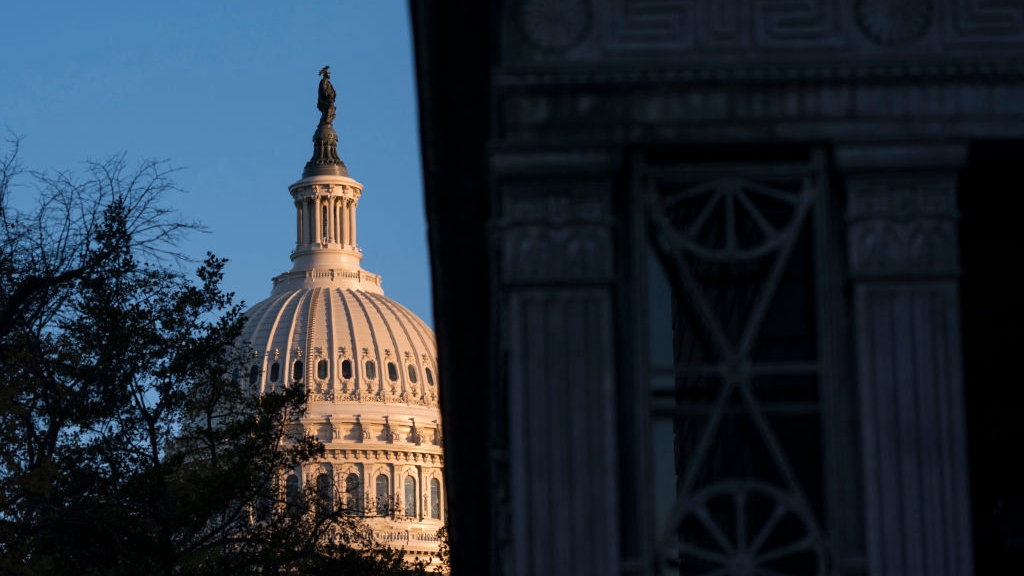
U.S. President Joe Biden walks across the South Lawn as he returns to the White House in Washington, DC, July 13, 2021. /Getty
U.S. President Joe Biden walks across the South Lawn as he returns to the White House in Washington, DC, July 13, 2021. /Getty
Editor's note: Bradley Blankenship is a Prague-based American journalist, political analyst and freelance reporter. The article reflects the author's opinions and not necessarily the views of CGTN.
U.S. President Joe Biden on July 13 delivered a scathing speech in Philadelphia, calling out Republicans across the country for attempting to disenfranchise voters and calling on Congress to pass the For the People Act and the John Lewis Voting Rights Advancement Act.
His speech came after 14 states enacted laws that limit voting access in reaction to false claims of voter fraud perpetrated by former President Donald Trump and his collaborators. It also came as Democratic lawmakers from Texas are boycotting a special session of the Texas House of Representatives, under threat of arrest, where similar legislation is expected to be passed.
"Hear me clearly. There's an unfolding assault taking place in America today, an attempt to suppress and subvert the right to vote and fair and free elections. An assault on democracy, an assault on liberty, an assault on who we are," Biden said during his speech at the National Constitution Center.
"The 21st century Jim Crow assault is real," he said. "It's unrelenting."
Biden's words are no exaggeration: Republicans are indeed trying to disenfranchise voters through new laws that restrict ballot access, specifically targeting minorities and young people.
This is because these demographics vote more reliably for Democrats as opposed to Republicans (though Republican Donald Trump pulled more immigrant and non-white voters in 2020 as opposed to his successful bid in 2016 to the bewilderment of Democrats).
For their part, Republicans argue that these laws are necessary to stop election fraud, the kind they believe took place during the 2020 election but actually didn't and is generally extremely rare.
The provisions of these laws make their intention clear, and it's also obvious that Republicans are trying to pre-empt demographic changes that are not in their favor (like in Texas or Arizona) or undermine successful voter registration efforts (like in Georgia).

The Capitol dome in Washington, DC, November 13, 2019. /Getty
The Capitol dome in Washington, DC, November 13, 2019. /Getty
It remains to be seen if Democrats actually have a way to stop these Republican-backed laws, but so far it looks like the institutional deck is stacked against them. Since the U.S. Supreme Court recently upheld an Arizona law limiting voting access, it means that Democrats must pass legislation at the federal level to stop Republican-led states from restricting ballot access. With how things stand, that will be incredibly challenging.
The most obvious hurdle that Biden and Democrats face is the members of their own party. Republicans are locked in against any voting-rights bill and have been from the beginning, which means that picking off any Republican votes to get this legislation through is impossible.
Given the rules of the U.S. Senate, any voting-rights bill would require a supermajority vote – which would be impossible for Democrats to get since the Senate is split 50-50 (not including Vice President Kamala Harris's tie-breaking vote).
It means that they would have to change the rules of the Senate to get rid of the "filibuster," which is the rule that makes most votes in the Senate require a supermajority. The problem is that some Democrats such as Senators Joe Manchin and Kyrsten Sinema are opposed to ditching the filibuster to ram through a Democratic Party agenda, arguing that Congress needs bipartisanship.
Even if Democrats did manage to unite to end the filibuster and pass voting-rights legislation, the bill's fate in federal court would be dubious at best since the federal courts, including the Supreme Court, are stacked with conservative judges. By itself, the Supreme Court has already repealed the Voting Rights Act of 1965, a key piece of legislation that came from the Civil Rights era, section by section for decades and there's nothing suggesting they would reverse course now.
Biden's use of the bully pulpit in Philadelphia was a smart move since it is getting the public talking about this issue, sending a message to lawmakers and allowing him to avoid criticism from his base. At the same time, without any serious initiatives from civil society, as happened at least in part with voter suppression legislation in Georgia, these laws – as well as legislation in the works – will most likely go unchallenged due to institutional constraints.
It begs the question then, if there is so much institutional support for "21st century Jim Crow" and no solid foundation for the "fundamental right of Americans to vote," does the U.S. have any right to call itself a "Beacon of Democracy" or even a democracy at all?
(If you want to contribute and have specific expertise, please contact us at opinions@cgtn.com.)

